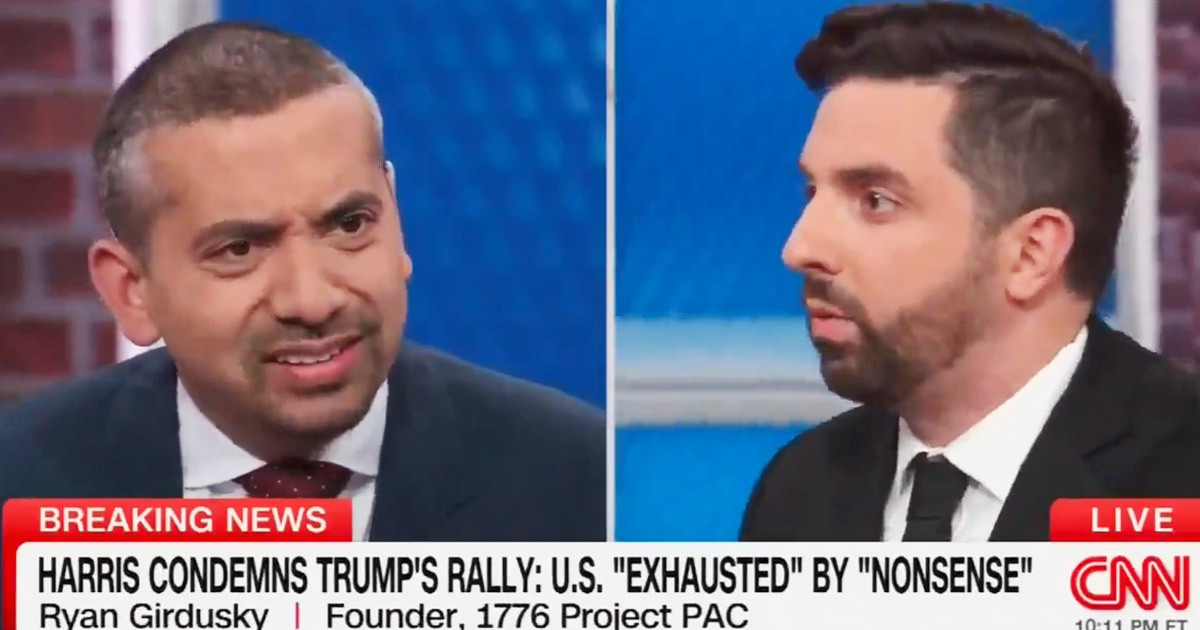Ryan Girdusky clashed with British-American journalist Mehdi Hasan on Monday night.
CNN has banned a conservative commentator from appearing on the network again after he told a Muslim journalist “I hope your beeper doesn’t go off,” an apparent reference to the spate of exploding pagers in Lebanon that killed members of the Hezbollah militant group last month.
Ryan Girdusky made the comment during a heated debate with Mehdi Hasan, a prominent British-American broadcaster and an outspoken critic of Israel’s war in Gaza, on “CNN Newsnight” with host Abby Phillip.
The guests were discussing the racist jokes made by comedian Tony Hinchcliffe, which overshadowed former President Donald Trump’s rally at New York’s Madison Square Garden on Sunday and continue to make headlines two days later.
As the debate turned fractious, Girdusky and Hasan sparred over whether the latter had been labeled an anti-Semite. “I’m a supporter of the Palestinians, I’m used to it,” Hasan said.
Girdusky replied: “Well I hope your beeper doesn’t go off.”



Good that they banned him. Wishing someone that has a conversation with you but does not agree with you this kind of harm means you need to be excluded from the discourse.
I agree that it was a blatantly out of line and wrong thing to say, but it’s not wishing harm. At least the phrasing isn’t.
Look at it this way. Say someone has tires on their car which are practically falling apart. The conversation goes:
Friend: “you really need to get new tires, they’re complete thread-bare”
Owner: “nah, they’re fine”
Friend: “you’re being negligent, I hope you don’t get into an accident”
The way the CNN conversation reads to me is that the guy was implying “if we listen to you, then things might progress to the point where you might get attacked, and I hope your pager doesn’t go off”.
Maybe that’s not what he meant, but generally that’s how such a statement is used.
No, he said exactly what he meant.
The logic Zionists employ: Palestinian = terrorist. Because Hasan said “I’m pro Palestinian” the other dude called him a terrorist and said harm should come to him using the phrasing “I hope your pager does not explode”. Because of the Hamas pagers recently being blown up by Mossad and Mehdi is pro Palestinian so a terrorist and would have a pager of a terrorist organisation.
CNN and everyone at the table rightfully reacted the way they did.
You completely glossed over what I said. If he “said what he meant”, then he said nothing to wish harm.
Edit:
No one is saying otherwise.
“I hope you don’t get raped wearing that.”
Totally cool things to say.
You’re not making any argument against what I said. Your comment “totally cool things to say” implies I’m arguing that the guy on CNN said nothing wrong. Which isn’t true.
Well then, if I would tell you I" hope you don’t get a cut on your tongue from all the boots you lick" how would you interpret that? As its the same type of gist.
It’s incredibly spiteful and passive aggressive, but that’s still not wishing harm. For it to be wishing harm it would have to be “I hope you DO get a cut on your tongue from all the boots you lick”.
You’re wrong on this one buddy. Using irony as a shield from consequences is a classic strategy for assholes and fascists alike. Just like the “it’s just a joke, bro”.
Have a nice evening.
Well, I think you’re entirely right about that.
That whole thing has always been lame and annoying.
You too.
No. The message is hidden between the lines. He’s not saying he hopes they don’t get bombed; he’s saying you deserve it while hiding behind sarcasm.
That’s still not wishing harm! This is basically “just desserts”. It implies the person gets what they deserve (good or bad). Depending on the context it can be benign or malicious, but it’s still not wishing harm.
It’s basically like saying “you are going to get hurt, it’s your fault, it’s what was coming to you, and I have no sympathy”. We can debate about which interpretation makes him look worse, but I’m entirely firm on my “not wishing harm” stance. I can agree I’m maybe splitting hairs or not considering intent, but the meaning of the words spoken is not literally about wishing harm.